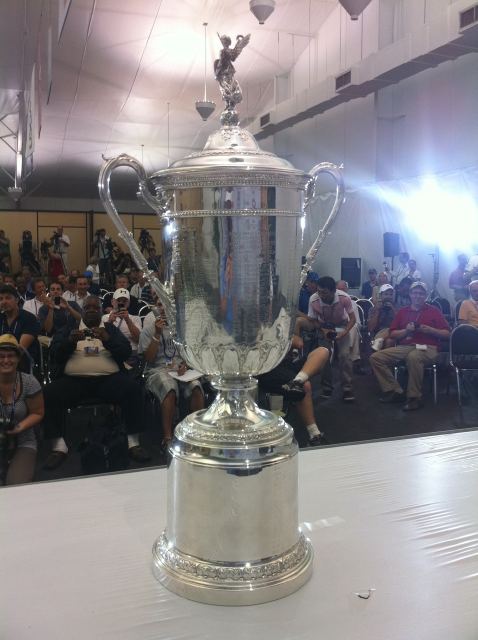Mere moments after winning the U.S. Open, thousands of Twitter followers viewed an exclusive picture of the championship trophy as seen through the eyes of the champion.
When Rory McIlroy took with his camera phone, snapped a picture of the trophy, and posted it to his Twitter account (all while seated at the media center during his news conference), he allowed potentially millions of people to see an exclusive picture that members of the media, who, ironically were shown in the background behind the trophy, could not provide.
The only thing better would have been if McIlroy took out his phone and snapped a picture on the 18th green, immediately after sinking his final putt.
That day may soon be coming.
For McIlroy, sharing the photo was a way to let his fans join in the celebration of his victory.
For the rest of us, it is just the latest example that demonstrates the power Twitter holds.
On the same day McIlroy began his historic U.S. Open run, ex-congressman Anthony Weiner resigned after the uproar initiated by his posting of lewd photos on Twitter.
In May, the raid of Osama bin Laden was unknowingly live tweeted by Sohaib Athar, who lived near the site of the raid. Keith Urbahn, Chief of Staff for Donald Rumsfeld, tweeted the news of bin Laden’s death first, thereby setting off an explosion of tweets that broke the news worldwide before the major news organizations had the chance to.
The bin Laden story also made an impact in the athletics world on Twitter when NFL player Rashard Mendenhall sparked controversy with his tweets. Soon after the Mendenhall storm, fellow NFL player Reggie Bush caused his own commotion with his failed attempt at humor on the NFL lockout.
Those are just a few of the most noteworthy examples that have happened recently. With each passing day, more and more inevitably occur.
For a public figure, such as a politician or athlete, Twitter holds an appeal of being able to express a thought directly to the public, bypassing the filter of the media.
It’s easy to understand the appeal. A thought expressed on Twitter is not only displayed to the followers on that person’s account but potentially all their followers, and their followers, and so on to the point when it can reach the 200 million people who are on the social network site.
The prospect of reaching that many people can be an intoxicating feeling.
But there are pitfalls.
The intoxicating feeling can be so powerful that good judgment often becomes a casualty.
For Anthony Weiner, it was the downfall of his career. For Rashard Mendenhall and Reggie Bush, it is a lesson that trying to express a thought in 140 characters or less can be interpreted in ways the user did not intend.
For all of us on Twitter, there is a simple lesson to heed in order to harness the power of the social network juggernaut.
So simple in fact, it is fewer than 30 characters in length.
Think before you tweet.

